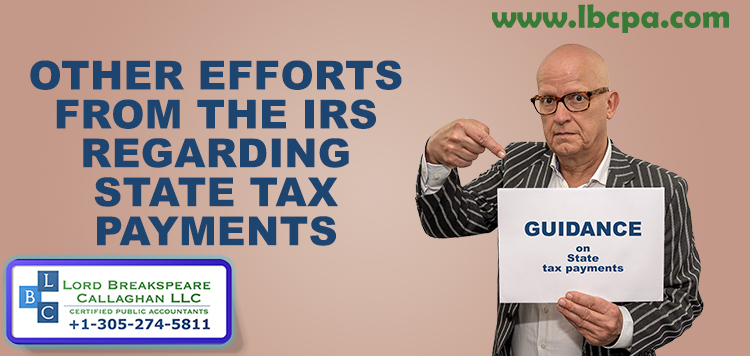LBCPA News 
Click here to go back
IRS Issues Guidance on State Tax Payments

The IRS provided guidance on the federal tax status of refunds of state or local taxes and certain other payments made by state or local governments to individuals. The IRS previously provided guidance on state payments made in 2022 in news release IR-2023-23, IRS issues guidance on state tax payments to help taxpayers.
The guidance is being issued as part of the IRS's efforts to provide additional certainty to states and their residents regarding the federal income tax consequences of state payments made to taxpayers.
In 2022, a number of states implemented programs to provide payments to certain individuals residing in their states. Many of these programs were related, directly or indirectly, to the various consequences of the Coronavirus Disease 2019 (COVID-19) pandemic, and the programs varied in terms of the types of payments, payment amounts and eligibility criteria. IRS issues guidance on state tax payments to help taxpayers addressed the federal tax treatment of these 2022 payments.
Notice 2023-56 describes certain types of state payments to individuals and the federal tax treatment of those payments. This updates the previous guidance, which only described the taxability of payments made during 2022. Today's notice also requests comments regarding the application of the rules described in this notice, as well as specific aspects of state payment programs or additional situations on which federal income tax guidance would be helpful.
Most taxpayers receiving state tax refunds do not have to include the state tax refund in income for federal tax purposes. As a general rule, taxpayers who choose the standard deduction on their federal income tax returns do not owe federal income tax on state tax refunds.
The vast majority of taxpayers claim the standard deduction. For instance, in tax year 2021, 90% of individuals claimed the standard deduction instead of itemizing their deductions.
Taxpayers who itemize their deductions on their federal income tax returns and receive a state tax refund must include the refund in income only if they deducted the state tax paid. Because of the $10,000 limit on itemized deductions for state income and property taxes, some itemizers are not able to deduct all of the state taxes they paid and do not need to include a refund in income.
Spillover payments under 2022 programs covered by IRS issues guidance on state tax payments to help taxpayers
Some of the 2022 programs included in IRS issues guidance on state tax payments to help taxpayers provided for certain state payments under the program to be made in early 2023. To the extent that the news release provided that taxpayers can exclude the state payment received in 2022 from federal income, this treatment also applies in 2023. This means taxpayers who did not get a payment under the program during 2022 may exclude from federal income a state payment provided under the 2022 program but actually received in 2023.
State general welfare programs
Payments made by states under legislatively provided social benefit programs for the promotion of the general welfare are not included as income on an individual recipient's federal income tax return.
To qualify for the general welfare exclusion, state payments must be paid from a governmental fund, be for the promotion of general welfare (that is, based on the need of the individual or family receiving such payments), and not represent compensation for services.
If you have any questions regarding Essential Business Accounting, Domestic Taxation, International Taxation, IRS Representation, U.S. Tax Implications of Real Estate Transactions or Financial Statements, please give us a call at +1-305-274-5811.
Source: IRS






